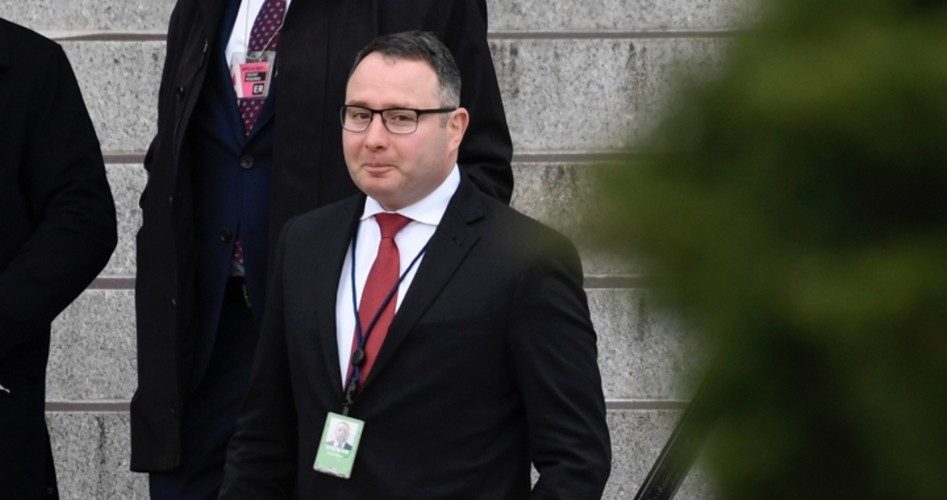
President Donald Trump fired Lt. Colonel Alexander Vindman (shown) and Gordon Sondland from their respective positions on the National Security Council and as ambassador to the European Union on Friday. Despite media howls to the contrary, it was an action he absolutely needed to take. The only problem is that he did not do so months ago.
During the impeachment hearings in the House of Representatives, Vindman and Sondland gave damaging testimony against Trump. Two days after being acquitted in the Senate of the impeachment charges leveled by the Democratic Party-controlled House, Trump ousted both individuals. He also ridded the White House of Vindman’s brother, Lt. Colonel Yevgeny Vindman, who was a lawyer in the White House. Yevgeny Vindman has been reassigned to the Army.
Sondland told the House, “Everyone was in on the loop,” concerning Trump’s alleged desire to press Ukraine for investigations into former Vice President Joe Biden’s son, Hunter Biden. Hunter Biden was under investigation by a Ukrainian prosecutor, when then-Vice President Joe Biden demanded the Ukrainian government fire that prosecutor or face losing a billion-dollar loan guarantee from the United States. This certainly seems to be something that should be investigated, if Trump is going to make sure the laws are faithfully executed, as the Constitution requires.
Vindman’s lawyer, David Pressman, released a statement, in which he said, “The truth has cost Lt. Colonel Alexander Vindman his job, his career, and his privacy.” He added, “He did what any member of our military is charged with doing every day: he followed orders, he obeyed his oath, and he served his country.”
This statement is nonsense. How could firing Vindman cost him his “privacy”? Vindman cast off his “privacy” when he began working on the National Security Council, and he certainly, on his own volition, cast it off when he testified before the House of Representatives. He is a public figure. If he wants privacy, perhaps he should go to work as a stocker at Walmart.
Insofar as costing him his “job” and his “career,” this goes to the heart of the matter. Vindman and Sondland serve at the pleasure of the president of the United States. It is the president’s constitutional duty to “take care that the laws are faithfully executed.” If he comes to believe that an aide or an ambassador are obstacles to that happening, he is not only within his rights, he is constitutionally obligated, to sack them.
Vindman’s lawyer said “truth” had cost Vindman his job. If Trump had allowed Vindman or Sondland to remain in their jobs after them casting aspersions of the president, it would be essentially an admission by Trump that their testimony was the truth. Look at it this way: If Trump believes that the testimony of these two subordinates was an unfair representation of events, what is he supposed to do? Pin a medal on them?
In some ways, Trump’s troubles in this matter were his own fault. He should have never kept people like Vindman in his job. Vindman is clearly a political enemy of the president. And allowing over a dozen people to listen into his conversation with the president of Ukraine was foolhardy, to say the least. Trump should realize — perhaps he now does realize it — that the executive branch is populated with untold numbers of individuals who are Democratic partisans, holdovers from the Obama administration, and supporters of the globalist “Deep State.” (Some are Republicans, but are still supporters of the globalist “Deep State.”) These individuals are entrenched enemies of Trump’s announced goals of guarding America’s national sovereignty. If he is serious about doing so, he needs to rid his administration of all individuals who are trying to block his agenda.
One remark found in the lawyer’s statement was that Vindman had “followed orders.” Considering that the Constitution of the United States makes the president of the United States the chief executive of the U.S. government, and that Vindman, as a National Security aide, is under that chief executive, one wonders exactly who was giving Vindman such orders? It was assuredly not Donald Trump who ordered Vindman to obstruct the foreign policy goals of Donald Trump.
Vindman had every right to disagree with those foreign policy goals of President Trump. If so, he should have expressed them to his boss — the president of the United States. That he did not do so, but instead chose to “follow orders” from some unnamed individual to undercut his commander-in-chief, makes one wonder exactly who gave him those “orders.”
This is what needs to be investigated by Congress and the media.
Senate Minority Leader Chuck Schumer (D-N.Y.) reacted to the firing of Vindman: “Lt. Col. Vindman lived up to his oath to protect and defend our Constitution. This action is not a sign of strength. It only shows President Trump’s weakness.”
Actually, it shows Trump’s strength as chief executive. Had he left the Vindmans and Sondland in their jobs, it would have been a sign that he is too weak to do the job the American people elected him to do, which is to drain “the swamp.” Firing the Vindmans and Sondland is part of draining the swamp, and should be the beginning, not the end, of such firings, if Trump is serious about getting that job done.
Photo of Alexander Vindman: AP Images
Steve Byas is a university instructor of history and government and the author of History’s Greatest Libels. He may be contacted at [email protected]



